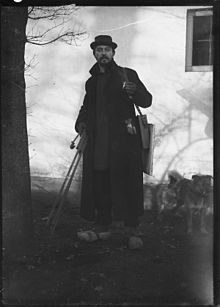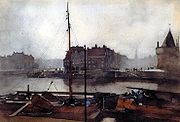Willem Witsen
Willem Arnoldus Witsen (born August 13, 1860 in Amsterdam ; † April 13, 1923 there ) was a Dutch painter, draftsman, photographer and writer. He came from the wealthy Witsen family , which also included Cornelis Jan Witsen , regent of Amsterdam in the 17th century, and his son Nicolaes Witsen .
Life
Witsen was a son of the graphic artist Jonas Jan Witsen. From 1876 to 1884 he studied at the Rijksakademie van beeldende kunsten ("Reich Academy of Fine Arts"). During this time he was on the board of directors of the St. Lucas artists' association named after the patron saint of painting. In 1881 he spent a short time in Antwerp with fellow artist Piet Meiners . In the same year his father bought the Ewijckshoeve estate, where Witsen stayed regularly until 1888. In 1885 he founded the Dutch etching club (Nederlandsche Etsclub) .
Witsen belonged to the "eighties", a group of young artists with great artistic and political influence in the eighties of the 19th century. He wrote under a pseudonym for the literary magazine De Nieuwe Gids, founded in 1885, and supported the paper financially. Painters like George Hendrik Breitner , Isaac Israëls , Eduard Karsen and Jan Veth as well as writers like Lodewijk van Deyssel, Albert Verwey , Hein Boeken and Herman Gorter were among his direct circle of friends. He was especially good friends with the poet Willem Kloos , who dedicated a few poems to him in October 1888 in the Nieuwe Gids .
Witsen stayed in London from 1888 to 1891 . Here he saw the work of James McNeill Whistler . He then worked for some time in the Laren artists' colony as well as in Rotterdam , in Wijk bij Duurstede and in Ede . For his prints of Dordrecht he made sketches in a boat. In 1899 he returned to Amsterdam, where he became a member of the artists' association Arti et Amicitiae .
Warehouses on an Amsterdam canal (1911, Rijksmuseum Amsterdam )
Rain, Thames Embankment , London. Etching (1890, Rijksmuseum Amsterdam)
Witsenhuis
The Witsenhuis ("Witsenhaus") is Willem Witsen's former studio in Amsterdam. The first floor has been preserved in its original state and has limited access to the public.
| personal data | |
|---|---|
| SURNAME | Witsen, Willem |
| ALTERNATIVE NAMES | Witsen, Willem Arnoldus (full name) |
| BRIEF DESCRIPTION | Dutch painter, draftsman, photographer and writer |
| DATE OF BIRTH | August 13, 1860 |
| PLACE OF BIRTH | Amsterdam |
| DATE OF DEATH | April 13, 1923 |
| Place of death | Amsterdam |



